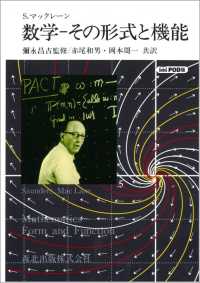- ホーム
- > 洋書
- > 英文書
- > Philosophy
Full Description
The literary and scientific renaissance that struck Germany around 1800 is usually taken to be the cradle of contemporary humanism. Posthumanism in the Age of Humanism shows how figures like Immanuel Kant and Johann Wolfgang Goethe as well as scientists specializing in the emerging modern life and cognitive sciences not only established but also transgressed the boundaries of the "human."
This period so broadly painted as humanist by proponents and detractors alike also grappled with ways of challenging some of humanism's most cherished assumptions: the dualisms, for example, between freedom and nature, science and art, matter and spirit, mind and body, and thereby also between the human and the nonhuman. Posthumanism is older than we think, and the so-called "humanists" of the late Enlightenment have much to offer our contemporary re-thinking of the human.
Contents
1. Introduction: Posthumanism after Kant
Edgar Landgraf, Gabriel Trop, and Leif Weatherby
I) DISSECTING THE HUMAN BODY: EMBODIMENT, COGNITION, AND THE EARLY LIFE SCIENCES
2. Vertiginous Systems of the Soul
Jeffrey West Kirkwood, Binghamton University, USA
3. Brain Matters in the German Enlightenment: Animal Cognition and Species Difference in Herder, Soemmerring, and Gall
Patrick Fortmann, University of Illinois at Chicago, USA
4. Agency without Humans: Normativity and Path Dependence in the 19th-Century Life Sciences
Christian J. Emden, Rice University, USA
5. Embodied Phantasy: Johannes Müller and the 19th-Century Neurophysiological Foundations of Critical Posthumanism
Edgar Landgraf, Bowling Green State University, USA
II) WHO'S AFRAID OF IDEALISM? MATERIALISM, POSTHUMANISM, AND THE POST-KANTIAN LEGACY
6. Kant and Posthumanism
Carsten Strathausen, University of Missouri, USA
7. Intimations of the Posthuman: Kant's Natural Beauty
Peter Gilgen, Cornell University, USA
8. Farewell to Ontology: Hegel after Humanism
Leif Weatherby, New York University, USA
9. Steps to an Ecology of Geist: Hegel, Bateson, and the Spirit of Posthumanism
John H. Smith, UC Irvine, USA
10. Protecting Natural Beauty from Humanism's Violence: The Healing Effects of Alexander von Humboldt's Naturgemälde
Elizabeth Millán, DePaul University, USA
III) CYBORG ENLIGHTENMENT: BOUNDARIES OF THE (POST)HUMAN AROUND 1800
11. Posthumanist Thinking in the Work of Heinrich von Kleist
Tim Mehigan, University of Queensland, Australia
12. Positing the Robotic Self: From Fichte to Ex Machina
Alex Hogue, Coastal Carolina University, USA
13. In Defense of Humanism: Envisioning a Posthuman Future and Its Critique in Goethe's Faust
Christian P. Weber, Florida State University, USA
13. Beyond Death: Posthuman Perspectives in Christoph Wilhelm Hufeland's Macrobiotics
Jocelyn Holland, California Institute of Technology, USA
15. The Indifference of the Inorganic
Gabriel Trop, University of North Carolina, USA
Bibliography
Notes on Contributors
Index






